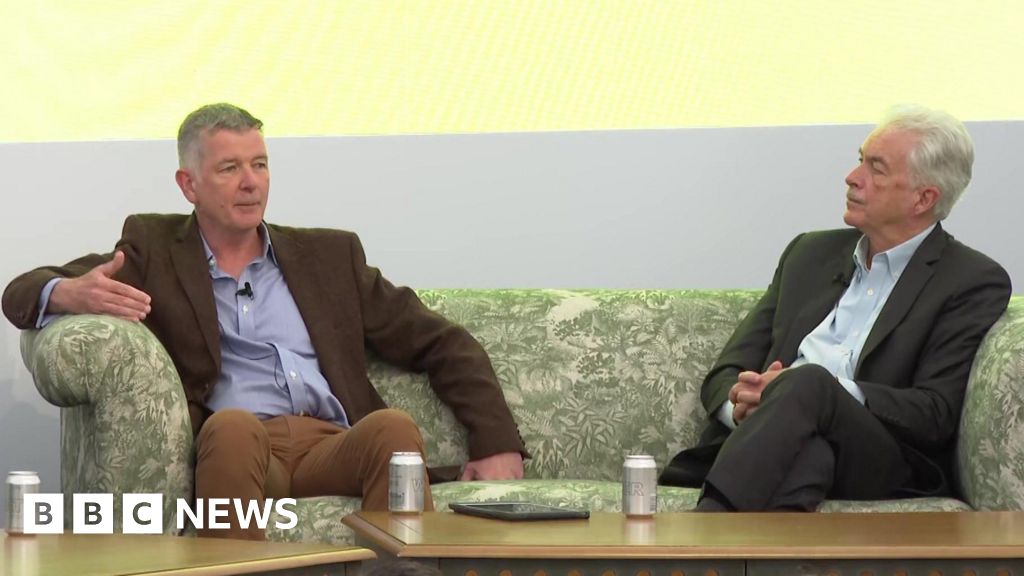The international world order is under threat “in a way we have not seen since the Cold War,” warned the heads of the British and US foreign intelligence services.
The heads of MI6 and the CIA also said that both countries would work together to “resist a confident Russia and Putin’s war of aggression in Ukraine.”
In a first joint article, Sir Richard Moore and William Burns wrote in the Financial Times They had seen the war in Ukraine coming “and were able to warn the international community,” including by revealing secrets to help Kiev.
And they said work was underway to stop Russia’s “ruthless campaign of sabotage” across Europe, to promote a de-escalation of the war between Israel and Gaza, and to use counterterrorism measures to halt the resurgence of the Islamic State (IS).
In the FT opinion piece, they wrote: “There is no doubt that the international order – the balanced system that has produced relative peace and stability and rising living standards, opportunity and prosperity – is under threat in a way we have not seen since the Cold War.”
“Successfully combatting this risk” is the foundation of the special relationship between the UK and the US, they added.
One of the “unprecedented threats” facing both countries is the war in Ukraine, which is already in its third year since the Russian invasion in February 2022.
The heads of the security services made their first joint public appearance on Saturday at the FT Weekend Festival in London’s Kenwood House.
The details of the speakers were kept secret until a few minutes before their appearance. They seemed relaxed with each other and emphasized the close cooperation between their agencies.
Burns told attendees that Ukraine’s recent seizure of Russian territory in the Kursk region was a “significant tactical victory,” but he saw no signs that Russian President Vladimir Putin’s power was waning.
Ukraine called on the West to supply more weapons and lift restrictions on their use in Russia.
The failure to do so was sometimes attributed to fears about Moscow’s reaction, but intelligence chiefs said this should not affect support for Ukraine.
“None of us should take the risks of escalation lightly,” Burns said.
He described a moment in late 2022 when he believed there was a “real risk” that Russia could use tactical nuclear weapons in response to setbacks on the battlefield.
Mr Burns sent messages to Russian officials warning of the consequences of their actions.
“However, I have never thought – and this is the view of my agency – that we should be unnecessarily intimidated by this,” the CIA director continued.
“Putin is a tyrant. He will continue to rattle his sabre from time to time.”
When asked about the apparent increased willingness of Russian intelligence services to carry out covert operations in Europe, such as acts of sabotage and arson, Sir Richard Moore said their use of criminals to carry out attacks indicated a degree of desperation.
“The Russian secret services have sometimes taken on somewhat wild proportions in their behavior,” he said.
Mr Burns added that while the plans sometimes seemed amateurish, they could still be “reckless and dangerous”.
In their joint article for the British newspaper FT, both men said it was “more important than ever” to “stay the course” when it came to supporting Ukraine, adding that Putin “will not succeed”.
The conflict showed how technology can change the course of a war and underscored the need to “adapt, experiment and innovate,” they said.
They continued: “Beyond Ukraine, we continue to work together to stop Russian intelligence’s ruthless campaign of sabotage across Europe and its cynical use of technology to spread lies and disinformation designed to drive a wedge between us.”
Both foreign intelligence services view China’s rise as the greatest intelligence and geopolitical challenge of the century.
They have reorganized their services “to reflect this priority,” the couple said wrote.
They also said they had “worked hard” to promote restraint and de-escalation in the Middle East and had worked “tirelessly” to work out a ceasefire and a hostage agreement.
Mr Burns, who has played a central role in the ceasefire efforts, hinted at the FT event that a more detailed proposal could emerge in the coming days.
“This is ultimately a question of political will,” he said, adding that he “deeply” hoped that leaders on both sides would reach an agreement.
It has been eleven months since Hamas attacked southern Israel on October 7, killing about 1,200 people and taking another 251 hostage.
According to the Hamas-run Health Ministry, more than 40,000 people have been killed since then in the ongoing Israeli military campaign in the Gaza Strip.

